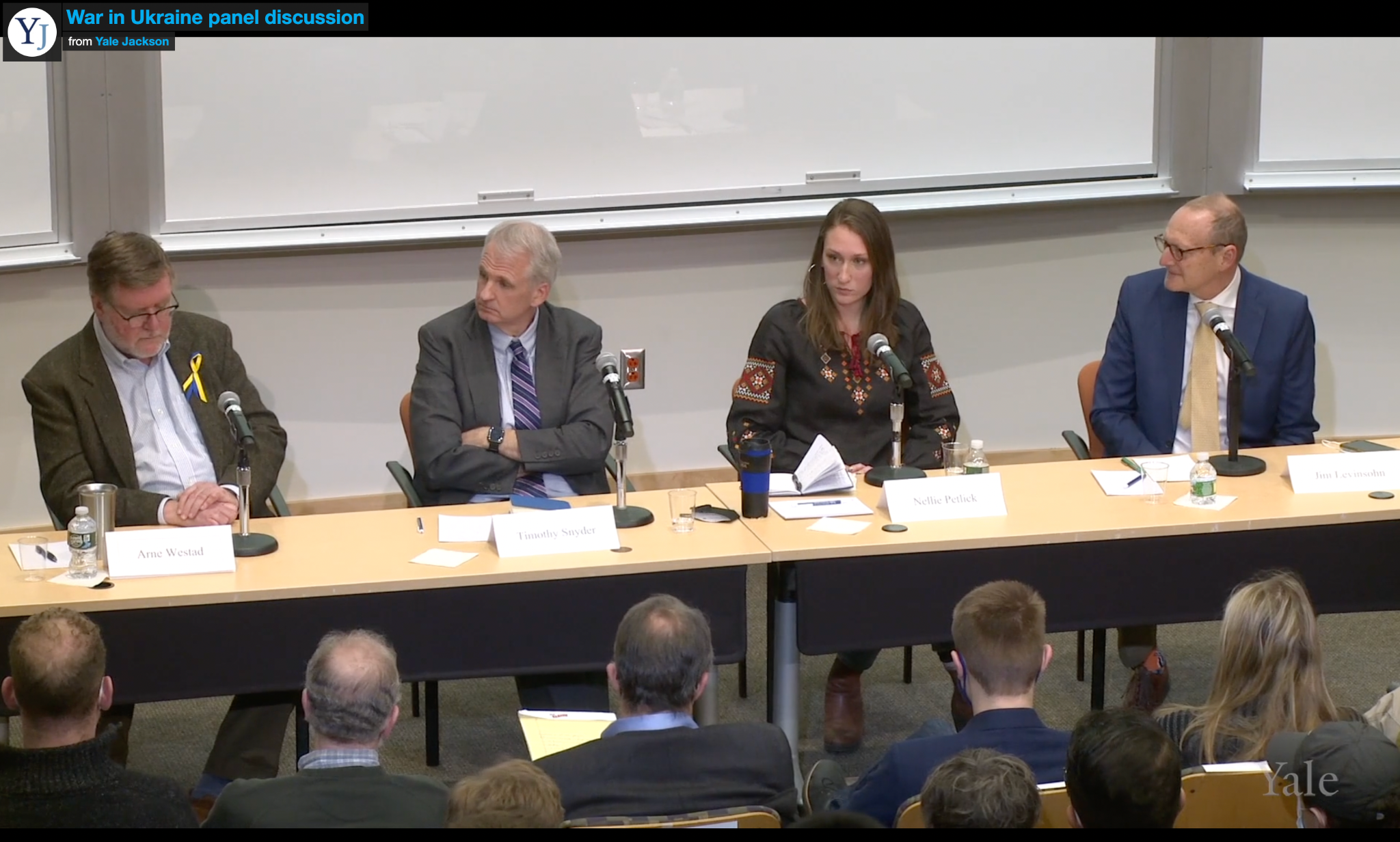Timothy Snyder, Arne Westad offer insight on ongoing war in Ukraine
At a talk held by the Jackson Institute on Friday, the world’s foremost experts convened to analyze the Russian invasion of Ukraine.

Olivia Lombardo, Contributing Photographer
Amid the ongoing Russian invasion of Ukraine, Yale experts spoke about how Ukrainian resistance had defied Russian expectations, the likelihood that the war would inflame tensions and expand around the globe and the need to decarbonize to limit Russia’s power.
The Friday event, titled “War in Ukraine,” was open to the Yale community and was moderated by Jim Levinsohn, director of the Jackson Institute. Levinsohn was joined by leading scholars in the field: Timothy Snyder, Richard C. Levin Professor of history at Yale, and Arne Westad, Elihu Professor of history and global affairs at Yale. Nellie Petlick JGA ’22, a graduate student in the Jackson School of Global Affairs who previously served as a Peace Corps volunteer in south-central Ukraine, joined them to provide a “human perspective” to analysis of the conflict.
“[Russia believed] the Ukrainian government would quickly collapse,” Snyder said. “[They believe that] Ukrainians are some kind of inchoate mass … and will just listen to the stronger.”
Westad was the first panelist to speak, and talked about how Putin is engaged in a fight against the recognition of “Ukrainian nationhood.” While Putin’s intentions, according to Westad, are to create a Russian superstate, he said that Russia’s invasion of Ukraine will only further isolate Russia and make the country more dependent on China.
Furthermore, Westad predicted that the invasion will lead to tensions on a global scale unlike those seen in a very long time because “this war is in no way over.”
Snyder drew contrasts to a previous invasion of Ukraine in 2014.
In 2014, Russia invaded Ukraine, and occupied and annexed the Crimean Peninsula. Snyder noted that during that invasion, Russian special forces attempted to provoke rebellions in eight Ukrainian districts with partial success in two of them, one being around the city of Donetsk.
According to Snyder, Russia’s ongoing invasion of Ukraine is different. The current violence is based on a “very familiar governing assumption” steeped in a colonial power mentality, he explained.
Snyder also spoke about how war in Ukraine should be viewed on a global scale. He said that the short-term goals should be thinking about and supplying resources to Ukranians, but to get to the 22nd-century, we must work towards breaking up Russia’s “hydrocarbon oligarchy.” This war, he said, is a strong reason to shift to clean and safe sources of energy.
Petlick, having spent time working with Ukrainian students and forming an intimate community in Ukraine, spoke about a strong need to recognize the humanity of Ukrainians. In the wake of the Russian invasion, Petlick has been working with Ukrainian organizers who encourage the general public to listen to Ukrainian voices and amplify them, call their congresspeople to push for more aid and to donate to Ukrainian organizations.
“I really want to highlight the generosity and the love of the Ukrainian people,” Petlick said. “And I’m really glad that the rest of the world is seeing the spirit of Ukranians right now.”
Petlick shared resources that both she and Elen Aghekyan JGA ’22, another graduate student at the Jackson School, collaborated to assemble. These resources provide places to send donations as well as suggestions of non-monetary ways to help.
Nine days before the Jackson talk, and before Russia invaded Ukraine, Yale’s Alexander Hamilton Society held a debate on the current tensions between Russia and Ukraine as they unfolded. Raphael Cohen, the director of the Strategy and Doctrine Program of RAND Project AIR FORCE and a senior political scientist at the RAND Corporation, shared that Putin was likely afraid of the possibility of Ukraine democratizing, and the potential for it to threaten Russia’s power on a global stage.
Levinsohn, who will oversee Jackson’s transition to a full professional school this year, stressed that the school will focus on “the global challenges of the day,” and that currently, the conflict “tops that list.”
“I think a critical component to understanding the geopolitical landscape today is learning from the lessons of the past and Yale in general and Jackson in particular have some of the best international historians in the world,” he said.
Russia launched a large-scale invasion of Ukraine on Feb. 24, 2014 according to Reuters.







